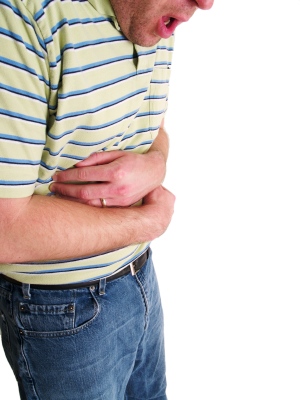by Dr. Tina Marcantel
Peptic ulcer disease is a painful and potentially debilitating condition, but there are measures you can take to accelerate healing and avoid recurrences of peptic ulcers. Dr. Tina Marcantel is a naturopathic doctor in Gold Canyon, Arizona, who also serves the East Valley cities of Gilbert, Scottsdale, Tempe, Chandler, Mesa, Apache Junction, and Queen Creek.
I recently had a relative diagnosed with a duodenal ulcer. Although he is on his way to recovery, certain lifestyle changes are necessary to help reduce the risk of a recurrence of ulcers in the future.
Peptic ulcers are open sores that develop on the inside lining of your stomach or upper small intestine. Bacterial infection or some medications can cause ulcers of the stomach and upper part of the small intestine (duodenum), so when your doctor suspects an ulcer it’s important to take a simple test to check for H. pylori infection. If H. pylori bacteria are detected in your system, you’ll need treatment with antibiotics to kill the bacteria before healing can begin.
 It’s important to note here that although H. pylori or the use of NSAIDs (e.g., aspirin or ibuprofen) may be the cause of the ulcer, lifestyle choices can play a large part in creating the conditions in the stomach that are conducive to the development of ulcers. Stress, smoking, alcohol, and poor diet can all lead to gastritis—an inflammation of the stomach lining that breaks down the mucosal lining. Conversely, a person who suffers with ulcers can greatly speed his healing by making certain changes in diet and habits.
It’s important to note here that although H. pylori or the use of NSAIDs (e.g., aspirin or ibuprofen) may be the cause of the ulcer, lifestyle choices can play a large part in creating the conditions in the stomach that are conducive to the development of ulcers. Stress, smoking, alcohol, and poor diet can all lead to gastritis—an inflammation of the stomach lining that breaks down the mucosal lining. Conversely, a person who suffers with ulcers can greatly speed his healing by making certain changes in diet and habits.
Peptic ulcer disease is divided into 2 categories: duodenal ulcers and gastric ulcers. There are similarities in the two, but they are viewed differently by doctors and have distinctive treatments. In this article we’ll concentrate on duodenal ulcers.
It’s been found that approximately one-half of those who develop duodenal ulcers actually secrete more acid than would be considered normal and that can be a contributing factor. (They have twice as many acid-producing cells—called parietal cells—compared to the normal amount.) Genetics plays a major role in this—often a family history of ulcers can be seen.
Along with H. pylori infection, some possible contributing factors of duodenal ulcers include smoking, stress, and NSAIDs use that can lead to the mucous lining breakdown in the duodenum. Caffeine and alcohol both stimulate acid secretion that can eventually lead to ulceration.
Poor nutrition can also contribute to inflammation of the lining of the duodenum, exacerbating peptic ulcer disease. Deficiencies in zinc, essential fatty acid, vitamins A and E, and glutamine can slow the healing process. Food sensitivities can cause inflammation of the mucosal lining, as well, so it’s important to identify any food intolerance that can trigger symptoms.
Treatment begins with removal of the causative agent. The first step, as mentioned previously, is the elimination of H. pylori bacteria if they are present. Alcohol, NSAIDs, caffeine, spicy foods, milk, and black pepper should be avoided. Your doctor may prescribe acid blockers or proton pump inhibitors to reduce the amount of acid your stomach is producing, but there are many natural approaches you can take to support healing.
Increasing certain nutrients will aid the production of protective substances in the duodenum or stomach. Zinc picolinate stimulates mucous production and improves gastric ulcer healing. Essential fatty acids found in safflower oil, black currant oil, primrose oil, and fish oil are anti-inflammatory and provide protection of the mucosal lining.
Increased dietary fiber can have an acid buffering effect and can help protect the mucous lining. Refined products have been shown to increase stomach acid, so avoid white sugar and white flour. Avoid milk as it may stimulate acid production.
Vitamin C is recommended to reduce oxidative damage produced by free radicals from peptic ulcer disease. Cabbage juice is high in glutamine, another healing agent, and aloe vera juice provides good coating to help protect the mucosal lining.
There are a number of anti-inflammatory herbs that can be used and there are also selected acute homeopathic remedies that are effective. Homeopathy is individualized and should be given at the direction of your naturopathic or homeopathic physician.
